- Home
- William Styron
Set This House on Fire Page 3
Set This House on Fire Read online
Page 3
On this very spot I had gone down, down in a cataclysm of bubbles trailing frantic handfuls of seaweed, and shot floundering to surface way out on the tidal creek, spouting water like a whale and strangling with sudden tumultuous love for my fleeting life, until a colored crab fisherman, poised in his boat like some black merciful and sweating Christ above the deep, hauled me in by the hair. I got a beating, and for days I leaked water from my ears; my father repaid the fisherman with a country ham and five silver dollars—which even to reward a savior in those depression years was more than he could afford—but though I was warned thereafter to stay away from the place I sneaked back here, alone, during the summer days. For now everything about the place—the creek and the scuttling crawfish, salt swamp and sunlight and flashing gulls, and the streetcar trestle astride the reeds and the chiming uproar of the trolley as it swayed through the marsh, rattled across the trestle and was gone in a shower of popping sparks, its electric singsong monotone receding as if into infinity or time itself and leaving all behind with a quality of noontime and seaside and an insectstrumming drowsy yellow solitude—all of these seemed to be informed by a sense of mysteriousness and brevity. Like that moment when a long-familiar scrap of music is suddenly heard as if with new ears, and crashes in upon you no longer a simple tune or melody but a pure and wordless overflowing of the heart, so this scene for me had more lights and darks than I had ever imagined, and titanic new dimensions, and I stole up upon it with trembling and fascination. Here there had been taken away from me that child’s notion that I would live forever; here I had learned the fragility not so much as of my own as of all being, and for that reason if it seemed a cruel scary place it also possessed a new and fathomable beauty. So, packing a secret lunch, I went back there day after day. Lying on my belly in the reeds I would poke the crawfish with a stick, and watch them scuttle away, and brood and dream in the hot sun. The streetcar would come with a metallic whir and jangling, and recede into the stillness of noon. The gulls would flash against the sky. In their boats the black fishermen, far out, would call for the wind in hymning voices and suddenly all would be still. And in that stillness, with the yellow new world spread out before my eyes, gorged upon mayonnaise and soda pop, I shivered with the knowledge of mortality.
Yet here on the identical spot, years later, I thought that nothing could be victim of such obliteration. My great-grandchildren’s cleverest archaeology will strive in vain to unlock that sun-swept marsh, that stream, those crawfish, that singing trolley car. Everything was gone. Not just altered or changed or modified, not just a place whose outlines may have shifted and blurred (new growth here, no growth there, a new-fledged willow, a deepened cove) but were still recognizable, dependable, fixed—my marsh had vanished, a puff into thin air, and nothing of it remained. How many tons of earth, sand, rock, rubble, rubbish, and plain old Port Warwick garbage had gone into this stupendous unmaking would be hard to say; the job had been thorough and complete. Beneath it all, one seascape, entombed forever. Around us now in eccentric loopings, upon terraced lawns row on row, a horde of diminutive houses called (why?) Glendora Manor squatted in the twilight. Tail-finned cars larger than the dwellings themselves cruised ponderously through the tiny streets, scattering cocker spaniels, and coming to rest alongside lawns where sprinklers whirled, and motorized lawnmowers towed their masters through the greenly churning dusk, and globes on pillars glittered like silver basketballs. The trees, so far, were small but they appeared to be trying. And here, I calculated, drop a plumb line straight down from the Esso Extra pump and you’d hit the spot where I sank beneath the foaming brine.
So much for my childhood. In times of stress and threat, I’ve heard it said, in times of terror and alarms, of silence and clinging, people tend to hold on to the past, even to imitate it: taking on old fashions and humming old songs, seeking out historic scenes and reliving old ancestral wars, in an effort to forget both the lackluster present and a future too weird and horrible to ponder. Perhaps one of the reasons we Americans are so exceptionally nervous and driven is that our past is effaced almost before it is made present; in our search for old avatars to contemplate we find only ghosts, whispers, shadows: almost nothing remains for us to feel or see, or to absorb our longing. That evening I was touched to the heart: by my father’s old sweetness and decency and rage, but also by whatever it was within me—within life itself, it seemed so intense—that I knew to be irretrievably lost. Estranged from myself and from my time, dwelling neither in the destroyed past nor in the fantastic and incomprehensible present, I knew that I must find the answer to at least several things before taking hold of myself and getting on with the job. “You mean Miss Minnie Morehouse, from Whaleyville?” my father was saying, in that slurred Tidewater accent which I too had had once, and lost. “Why, of co’se I was. I was there indeed. And put flowers on her grave!”
For a moment I believe I must have shut my eyes, then opened them again, thinking that somehow by such a ritual I might come miraculously to, amid the reeds once more, surveying the place where life had left me dumb-struck, shorn of illusions and innocence. But here in the changing present all was shadow: I saw nothing, heard nothing, except in my own mind again, where gulls flashed overhead and that trolley car swayed, chiming, as if through the light of centuries, and like a phantom. …
That evening I sent a wire to Cass Kinsolving in Charleston, telling him I would be coming down the next day. I had rarely done so rash a thing before, and I knew I had to take a chance on his good will. But without knowing about Cass I could never learn about what happened in Sambuco—about Mason, and my part in the matter.
Two years before, I had never laid eyes on Cass. Our meeting was not terribly auspicious, you might say—although even then he seemed to be an unusual sort—and he might have passed right on out of my life had I not, only a few hours later that same day, gotten myself situated on the periphery of those events of which he was the dead center. I would like to describe that meeting, and the circumstances which led up to it, if only so you will be able to understand why I went to Sambuco in the first place, thereby getting myself mixed up in the whole wretched business.
When Mason Flagg wrote me in Rome, inviting me down to Sambuco for a visit, I felt that nothing fitted in better with my plans. I had been in Europe for four years—and in Rome for three—and I had come to the point where I sensed that my roots, such as they were, must be replanted in native soil or shrivel away completely. So it was that Mason’s invitation nicely coincided with the “last look around” I planned to take before going back to America.
How I got to Europe, and what I was doing there, is a brief and easy matter to explain. I had not been in the war (the one before Korea), having gotten a really horrible education under Navy auspices at a college in Illinois, from which I emerged with an ensign’s commission just two days after the bomb fell on Hiroshima. I went on to get a law degree and for a short time I worked in New York. Then, feeling somewhat cheated of travel and excitement, I decided to go to Europe—a traditional move, after all, for shiftless youths with murky horizons. I got a job in the legal division of a large government relief agency and for a while I was located in Paris, where I thought I might extend a democratic hand to the war-racked and the downtrodden, and where I ended up hearing the complaints of alienated bureaucrats, fellow employees from Louisville and Des Moines. My office had a fabulous view of the Place de la Concorde, and I occupied myself with itineraries and bills of lading which were works of art.
After a year I was transferred to Rome, and an even finer office facing on the ruined green sweep of the Circo Massimo: here in almost all seasons there was a carnival which livened up my days with braying horns and the crazed music of calliopes. I liked Rome, even though my routine—attending to the woes of the Agency employees—seemed just about the same: there is something in the Italian climate that makes the average American clerk. so remote from the mechanisms of progress, even more peevish and discontented; and the co
mmissary milkshakes—because of the quality of the milk—were not nearly so good as in Paris, although toward the end of my stay I learned that they began getting fresh shipments by air from Dutch dairies. But the job paid well enough (embarrassingly so, compared to my Italian office-mates, who appeared to work twice as hard for half the pay) and I bought a spruce little Austin sports convertible to carry me up and down the long slope to my home on the Gianicolo hill. I had an apartment there in a run-down building and an old rheumatic woman named Enrica who cooked suppers for me and filled my evenings with her tireless lament. I had a phonograph, too, a scratchy machine left me by a former American tenant, along with what seemed to be all the works of Wagner, Liszt, and Tchaikovsky ever recorded. The view from my terrace was luxurious, especially during summer twilights when I’d sit there playing a Liszt concerto, drinking commissary whiskey and watching the whole city spilled out beneath me in a luminous frieze of rust and gold. I had two or three girls during that time—a girl named Ginevra, and then one named Anna Maria, and toward the end, perhaps as some augury of the end of my expatriation, a junior from Smith College with wonderful black eyes—and usually there would be two of us there listening to the villainous music, perfectly content, while the setting sun touched the ramparts of the Forum with one last glint of perilous light, and the shadow of my hill, marching eastward, rolled up the city in darkness.
In all, it was a fine three years. I traveled all around and saw the sights and, possibly because I felt so happily enriched, regarded myself as somewhat superior to my friends at the Agency, whose limits of adventure in Italy were defined (outside of a flying trip to Capri each summer) by their apartments in the suburbs and by the bar downstairs in the Hotel Flora, where the martinis were dry and chill and made of the best English gin. I had, it is true, donated little enough to Italy but Italy had rewarded me in the simple fact of its warm and extravagant being, and since it is more blessed to give than to receive I felt that this, at least, might have made the Italians happy, where my grotesque attempts at “aid” and “relief” had not. At any rate, toward the end of my third year I decided to go back to America. Splendid as the city is, it is impossible to become Chief Justice of the United States Supreme Court in Rome. I had by that time saved a little money, and a number of ornate letters I had written had produced several tentative offers of jobs in New York. I might have departed Italy as blithe as a sparrow and with no regrets—except for Sambuco and the invitation I received from Mason Flagg.
The letter came on a day in early July, only a week or so after I had quit my job. I knew Mason had been in Sambuco ever since the spring. In May I had received a gossipy letter from him—the first in years—saying that he had gotten my address from a mutual New York friend, that he was now established in Italy for “a long spell of writing,” and that he would like to have me come down. It was a letter, however, which for reasons I think will be made evident later, I chose at the time to ignore. This other invitation weakened me, though; I felt foot-loose and adventurous, with no ties at all, and I had my eye cocked for new vistas. The note was breezy but specific—“stay as long as you like”—and typical of Mason, who was never one to understate the scope of his operations: “We are living in the goddamdest palace you ever saw.” I had never been to Sambuco, but Mason—with his picture of sun and sea, plus what sounded like a battalion of servants (“$50 a month for the lot and they stand around and out-yassuh any coon the old man ever had in Virginia”)—made it all seem lazy enough and I decided, rather than wait around in Rome, to drive down there the next day. I sent Mason a wire that I was coming. Sambuco is six hours by car from Rome; an hour from Naples. I had already reserved passage back to America from Naples, and so it was a convenient and fairly easy matter to switch my sailing to a date a week or so later. Not so the matter of my auto registration (it had expired), nor that of the car itself, which I had already made arrangements to sell through the Automobil Club Italiano, and which, if I was ever to swim in that cool blue sea far down the slope from Sambuco, I knew I had to hold on to. So my last afternoon in Rome—one I had expected to while away in mild nostalgia at some flower-rimmed café—was spent with a functionary at the auto club: a demonic, moon-faced woman, with sweat describing great blue hoops beneath her arms, who swore that at this late hour to think that I could in any way change the course of events was a sort of criminal dream. “Questa non è l’America, signore,” she wheezed darkly, “qui siamo in Italia.” The registration had expired, and that was that. So much the same for the car—committed irrevocably. Documents were brought out to support this point, and a huge code book and a group of dossiers; but I had learned in Italy that the more emphatic an official “No,” the greater one’s chances for success. And so toward evening, sweltering, I came away with my renewal and with the wretched title to the car—in the only country in the world where such a victory can leave one feeling hopelessly beaten.
I drove home in twilight, happy to have my car back and to know that I could get rid of it in Naples before I sailed, after all. But I felt hot and exhausted; the woman had cowed me, and I fell into a sort of despondent reverie, driving at a cripple’s pace toward home, past heat-worn and silent Romans, through avenues of withering, downcast trees. In St. Peter’s Square there was not a soul in sight, save two humid, hurrying nuns, and over the great cupola the very air seemed to churn and billow with the dreadful incandescence of the day. “Oh it’s hot—God!” I heard someone cry as I dawdled up the hill, but the city for once seemed oddly still —even the motorscooters had ceased their racket—all as if awaiting breathless, in one strangled hush, some latter-day holocaust.
Later, when darkness fell, it cooled off a bit and I was able to finish my packing. The house was a shambles—which was all right—because now, pictures down, chairs upturned, trunks and boxes everywhere, the place seemed stripped of any sentimental associations, and I was not disposed to snoop around for any. My Smith girl had left days before, spirited aloft on the first westbound plane by her mother—an angular example of Detroit Gothic—who had sensible plans for her daughter at Grosse Pointe. This was all right, too, I suppose; the core of our romance—love in the Eternal City—seemed long since to have become worn down by time and familiarity, and she had begun to cadge jars of peanut butter from friends at the Embassy, and spent long homesick hours going to American movies. And they were practices to which, too late, I realized I had been giving dull approval. But that evening I was far from happy, or even contented, and I didn’t know what to blame. Possibly, though, it was only the apartment, unclad now in that almost mystically inspired ugliness which Mussolini brought to the works of his era: a room of plywood, chrome, leatherette, and water stains, one sixty-watt bulb pulsing spiritlessly over all, and from the phonograph, the Pathétique—a faint, blurred convulsion. I was depressed to learn that I could have lived for so long in such an eyesore, but still saddened that this one seemed to be giving me up with the identical unconcern with which it had received me, three years before.
Anyway, it was getting late when I finished packing—almost nine o’clock—and old Enrica had my last meal on the table. She was a study in bereavement as she served me my meal, snuffling over the platter, wailing phrases in unfathomable Sicilian, and gazing at me from the kitchen with furtive, stricken eyes. No employer, she boohooed, fingering her sparse mustache, had been so kind, so gentile, and alas, she’d have to go back to Messina, because to work now for anyone else in Rome would be intolerable. She kept mumbling over the stove, gloomily rattling pots and pans. It helped make the meal a dismal one; the ravioli, on the table since eight, was like plaster, the wine bilious, syrupy, body-warm. But below the terrace the city spread itself out in a million flickering eyes of light. I could see the Colosseum, aglow in the phosphorescence of floodlamps, and a ruined assembly of stark white shafts where the Forum lay. Far past these, two oscillating points of red and green, an airplane, mounted the looming dark above the Alban Hills. Over the south and east, where I w
as going, hung a flashy crowd of Roman constellations, and a fire-trail of neon where the outskirts of the city rambled up the hills into sightless gloom and made Rome look suddenly more immense than any city in the world. And for a moment—though perhaps it was just the wine—I felt that Rome, too late, was finally intelligible to me, offering me at my departure no reproach at all, but only a tolerant, valedictory, and many-eyed wink, in its vast immortal patience with the barbarians of the earth, of which I was only the most recent. But the moment passed, I drank too much wine in a reckless effort to feel happier, and in an hour or so Enrica bade good-by to me. “Addio,” she cried, “buon viaggio. Enrica will miss you, signore.” And she hobbled out into the night, weeping bogus tears that came not wholly from grief, for later I discovered that she had taken with her, among other things (a fountain pen, gold tie clasp, etc.), my Remington razor, which at least she could use.
After this and by eleven o’clock, stumbling about the cluttered depot my apartment had become, I felt so intimidated that I could hardly wait to get to Sambuco. Feverishly I decided to leave that night. I loaded up the Austin, stuck a pint of bourbon in the glove compartment, and took off down the hill, dogged by the gray suspicion, all the way, that I had left something behind. But my tennis balls were with me, my guitar, and passport, and the pornographic studies, carefully disguised as a Maioli-bound Petrarch, which Mason had asked me, in a postscript to his letter, to get him on the Via Sistina. All was in place, I racked my head futilely, and only when the Tiber hove into sight did I realize that what I was really leaving behind—with both affection and a very special sort of malice—was simply Rome. But after so long a stay I felt such a leave-taking was peremptory, rude. I drove then, for the last time, into the Piazza Santa Maria in Trastevere, and there I had a beer.

 Selected Letters of William Styron
Selected Letters of William Styron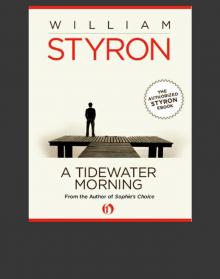 A Tidewater Morning
A Tidewater Morning Sophie's Choice
Sophie's Choice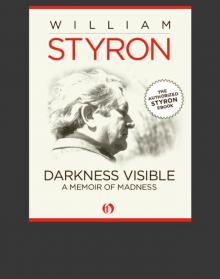 Darkness Visible: A Memoir of Madness
Darkness Visible: A Memoir of Madness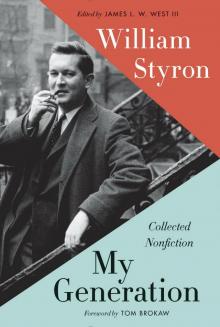 My Generation: Collected Nonfiction
My Generation: Collected Nonfiction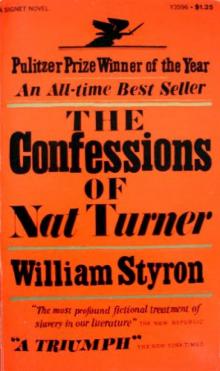 The Confessions of Nat Turner
The Confessions of Nat Turner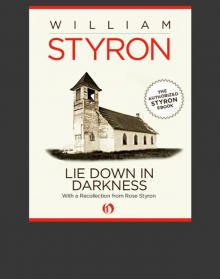 Lie Down in Darkness
Lie Down in Darkness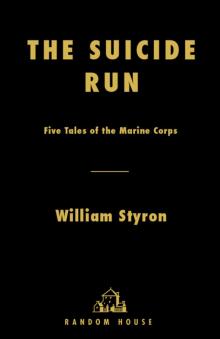 The Suicide Run: Five Tales of the Marine Corps
The Suicide Run: Five Tales of the Marine Corps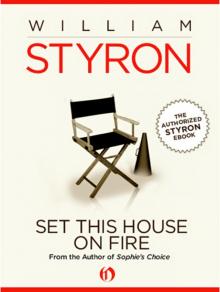 Set This House on Fire
Set This House on Fire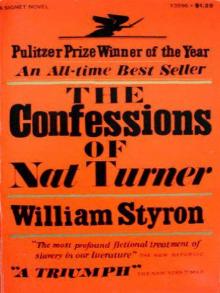 Confessions of Nat Turner
Confessions of Nat Turner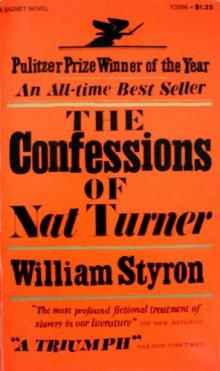 The Confessions of Nat Turner (1968 Pulitzer Prize)
The Confessions of Nat Turner (1968 Pulitzer Prize)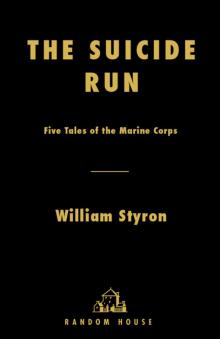 The Suicide Run
The Suicide Run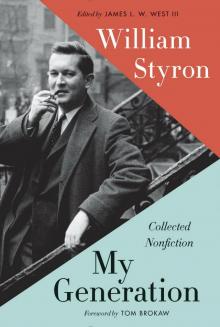 My Generation
My Generation Sophie's Choice (Open Road)
Sophie's Choice (Open Road)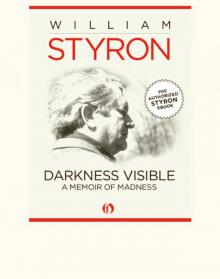 Darkness Visible
Darkness Visible